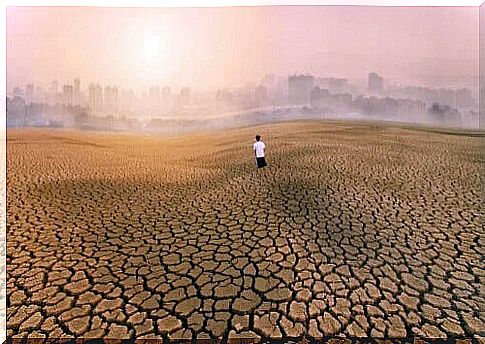Ecoanxiety, A Consequence Of Climate Change

The climate crisis is a reality. Poles are melting, species are becoming extinct at a dizzying rate, while ecosystems are changing and being destroyed. This gives rise to two problems: humanitarian conflicts over control of certain resources and concern about their scarcity. This concern affects each person differently, but for some it can be so profound that it directly affects their lives, as it does for those who suffer from ecoanxiety.
This concept, also known as climate anxiety, grew out of the need to name the chronic fear of environmental destruction. Concern about climate change and its consequences on all of nature can be considered a source of stress to add to everyday concerns.

Two possible reasons behind ecoanxiety
Ecoanxiety can be caused by two reasons. On the one hand, for having been forced to leave the place of origin or as an awareness of having an environmental conscience so developed that it leads to psychological discomfort .
the lost land
According to a report published by the European Union, every year around 26 million people are affected by meteorological disasters: floods, fires or severe storms.
There are residents of certain areas who are forced to emigrate due to these events. For example, one in ten people living on islands like Tuvalu and Kiribati ends up becoming a climate refugee.
Due to the environmental changes we are experiencing and causing, much of the biodiversity is being lost, and this makes certain places run out of resources.
Therefore, it is becoming more and more difficult, and even impossible, to reside in these areas. As a result, the United Nations estimates that around 1.5 billion people will have to move to survive.
In addition to the change they have to face by having to change their place of residence, these people who emigrate by force suffer when they see their land and environment destroyed, which can generate enormous concern and frustration.
environmental awareness
People who are attached to and aware of nature are affected by an emotional restlessness which, in addition, is accompanied by a sense of frustration due to the limited power of individual actions. So, there are people who really suffer from the effects we are causing on the planet.
An example of this is the current effect on teenagers and young people. An Oxford clinical psychologist has found that many preteens have eco-anxiety.
This is because children are more likely to understand and accept the idea that human beings are responsible for these climate changes. Therefore, they end up experiencing emotions such as resentment towards their elders that could have eased the impact, frustration, fear and sadness.
On the other hand, it’s amazing how widely environmental scientists are also affected. In this sense, Joe Duggan launched in 2014 a survey for scientists in which they were asked to respond to how climate change made them feel.
The results showed more of the same: hopelessness, fear, despair and worry. Indeed, British scientists recently published a letter in the prestigious journal Science asking for psychological help to better deal with the negative results of their studies.
Consequences
There are many consequences that occur due to climate change, in addition to eco-anxiety. Focusing on psychological aspects, these variations can lead to physiological changes that, in turn, affect people’s well-being. Our most basic physiological processes – like sleeping or eating – are heavily influenced by nature.
Sunlight, for example, and temperature affect circadian rhythms and regulate neurotransmitters that influence our health and mood. Therefore, radical changes in our environment compromise our body’s balance at all levels.
Natural disasters and high temperatures are also closely related to psychological disorders such as anxiety or mood disorders. For example, rising global temperatures are already having repercussions on mental health.
Research published by Nature reported that this increase is related to suicide rates. Another example would be another study that identified how pessimism increases in the face of significantly high temperatures.

What can we do about ecoanxiety?
On our part, in order to reduce the problem and our discomfort, the power to carry out three simple actions is in our hands:
- Think about climate change when deciding what to eat, how to travel, what and where to buy.
- Talk about climate change with people close to you. We may not be able to change the world, but raising awareness on a small scale can make a big difference.
- Know what measures are being taken in the political sphere and what the parties propose. Thus, we can also make decisions at the ballot box.
Faced with this situation, which can change little if we do not act immediately, experts recommend the promotion of resilience mechanisms. That is, understanding the problem as a multidimensional element.
Therefore, the best measure to reduce eco-anxiety would be to inform the population well and train them, giving each person the opportunity to be part of the solution.









